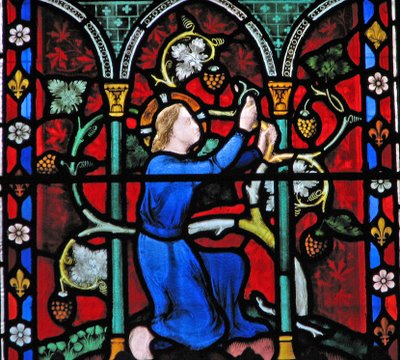There are you in the Chalice!

Fr Geoffrey Preston OP reflects on today's Gospel and presents the theme of the new wine of the Spirit that brings joy to humanity, a theme which was dear to the early Dominican preachers. Let us imbibe his wisdom and be intoxicated with the Word of Jesus Christ:
"We speak about the true Vine and its Vinedresser, its branches and its fruit. And we take the fruit of the vine, pour it out, give thanks to God and offer it and share it in that cup together. These words and gestures bring to expression the one reality which is Christ, the Vine which is Israel and the new Israel, the Vine whose fruit makes glad the heart of man...
For Christians who belong to the era of the incarnation, when God entered the realm of matter, there can be no doubting of the essential goodness of things, no kind of wish or suggestion that it would be better if they did not exist. We have to drink the fruit of the vine, and unless we drink of the fruit of the true Vine, we have no life in us.
More than that, we have in a sense to become wine for others, offering ourselves to them as the Vine's own fruit. 'I am the Vine, you are the branches. He who abides in me and I in him, he it is who bears much fruit.' And so Augustine can say, 'There are you in the chalice!' We stretch out our hands for the Eucharistic Bread, the Body of Christ, and find that we are receiving the mystery of what we ourselves are, his Body. Similarly in stretching out our hands for the Eucharistic Cup we are stretching out for ourselves, the fruit of the true Vine in the chalice answering to the fruit of the true Vine which we ourselves are. And as we have to become what we are on the paten - bread for the world, a source of nourishment for others - so we have to become what we are in the chalice - wine in other people's lives...
In the second and third centuries of the Christian era there were those who refused to use wine in the Eucharist, people known as Aquarians because of their so-called celebration was a cup of water. Cyprian explains that they repudiate wine as intoxicating and that is where they are false to the Scriptures, for the twenty second psalm, the psalm of the mysteries, says precisely that the Lord's chalice is intoxicating: 'My cup that inebriates, how wonderful it is!' (Ps 22:5). If we are to be consistent in our lives with what we practise in our sacraments we must be in some way intoxicating to people, a source for them of the joy which the Holy Spirit gives.
Yet we will almost certainly find that to be such a source of joy to others will mean suffering for us. The fruit of the true Vine which we drink in the Eucharist is the Blood of Christ, the blood of his sufferings and death. The fruit is pressed from the true Vine on the cross. If this plant is to flourish, and is truly to give that joy which rejoices gods and men, then it must be pruned savagely. A vine that grows wild and unpruned will soon cease to produce grapes of any size: it will be of use to no one. We can choose whether or not we will allow the Vinedresser to do his work 'for our good and the good of all the Church'. We can resist his activity. We can have such a zest for our own wild life that we refuse to accept the limitations that will be necessary if we are to bear fruit for the life of the world. Normally, the way God will prune our vine will be through each other, for other people define by their needs the extent of the outward luxuriant growth that is possible for us. In the end the alternative to accepting the discipline of the Vinedresser is to be cut off from the Vine itself... It is only as long as the branch continues to belong to the vine, as long as the sap of the Vine itself courses through it, that it is of any value to anyone."
The stained glass window above is from the Dominican Convent of Stone.







0 Comments:
Post a Comment
<< Home